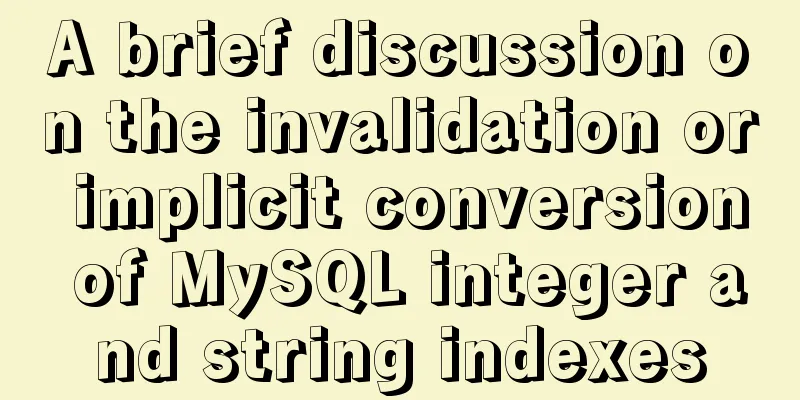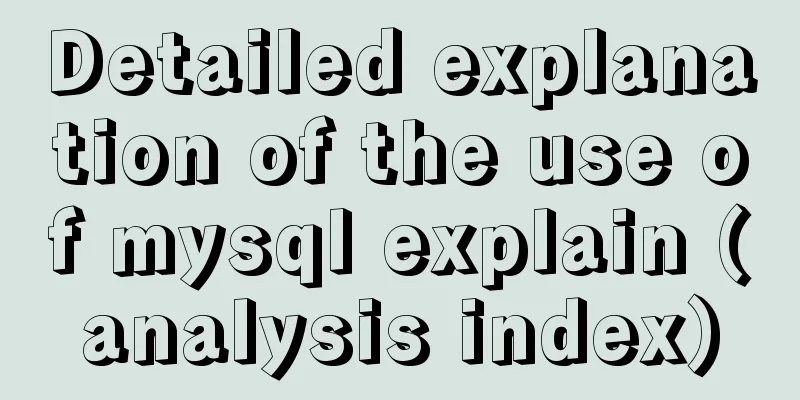A brief discussion on the invalidation or implicit conversion of MySQL integer and string indexes

Problem OverviewToday at work, the DBA suddenly found a piece of SQL, indicating that the SQL had implicit conversion and did not use the index. After checking, we found that it was a varchar type field. We used conditions to pass in a numeric value. Due to concerns about violating the confidentiality agreement, I will not post the picture here. Let me reproduce a similar situation for everyone to see. Problem ReproductionFirst, we create a user table test_user, in which USER_ID is set to varchar type and a unique index is added for the sake of effect. CREATE TABLE test_user ( ID int(11) NOT NULL AUTO_INCREMENT, USER_ID varchar(11) DEFAULT NULL COMMENT 'User account', USER_NAME varchar(255) DEFAULT NULL COMMENT 'User name', AGE int(5) DEFAULT NULL COMMENT 'Age', COMMENT varchar(255) DEFAULT NULL COMMENT 'Introduction', PRIMARY KEY (ID) UNIQUE KEY UNIQUE_USER_ID (USER_ID) USING BTREE )ENGINE=InnoDB DEFAULT CHARSET=utf8; The table data is as follows (the data still uses the same data as the last MySQL article MySQL uses UNION to connect two queries and sorting fails, but please note that the table structure is different.)
Next we execute the following sql EXPLAIN SELECT * FROM test_user WHERE USER_ID = 111; The explanations given are found to be as follows:
We put the condition in quotation marks and explain it as follows: EXPLAIN SELECT * FROM test_user WHERE USER_ID = '111'; At this time, we found that the varchar type field uses the index when it is queried as a string, but does not use the index when it is queried as a numeric type. Problem extensionSo the question is, if the field is an integer and has an index, will the index not be used when querying with a string? Practice makes perfect, let’s continue testing it. -- Change the type of USER_ID to integer CREATE TABLE test_user ( ID int(11) NOT NULL AUTO_INCREMENT, USER_ID int(11) DEFAULT NULL COMMENT 'User account', USER_NAME varchar(255) DEFAULT NULL COMMENT 'User name', AGE int(5) DEFAULT NULL COMMENT 'Age', COMMENT varchar(255) DEFAULT NULL COMMENT 'Introduction', PRIMARY KEY (ID), UNIQUE KEY UNIQUE_USER_ID (USER_ID) USING BTREE ) ENGINE=InnoDB AUTO_INCREMENT=6 DEFAULT CHARSET=utf8; EXPLAIN SELECT * FROM test_user WHERE USER_ID = 111; EXPLAIN SELECT * FROM test_user WHERE USER_ID = '111'; After executing the above two statements, we found that int type fields will be indexed regardless of whether they are queried as strings or numerical values. in conclusion
To sum up, I think it is best to add quotation marks when writing SQL in the future to avoid the situation where string types are not indexed. The deeper principles need to be explored further. If you have any opinions, please discuss them. This is the end of this article about the invalidation or implicit conversion of MySql integer index and string index. For more information about the invalidation of MySql integer index and string index, please search for previous articles on 123WORDPRESS.COM or continue to browse the following related articles. I hope you will support 123WORDPRESS.COM in the future! You may also be interested in:
|
<<: How to write HTML head in mobile device web development
>>: Independent implementation of nginx container configuration file
Recommend
Will Update in a Mysql transaction lock the table?
Two cases: 1. With index 2. Without index Prerequ...
A brief discussion on several ways to implement front-end JS sandbox
Table of contents Preface iframe implements sandb...
HTML page jump code
Save the following code as the default homepage fi...
Analyzing the node event loop and message queue
Table of contents What is async? Why do we need a...
Vue sample code for online preview of office files
I'm working on electronic archives recently, ...
Detailed explanation of the basic commands of Firewalld firewall in Centos7
1. Basics of Linux Firewall The Linux firewall sy...
The latest Linux installation process of tomcat8
Download https://tomcat.apache.org/download-80.cg...
Detailed explanation of the use of Gulp.js, a powerful tool for front-end task construction
Table of contents Overview Install Gulp.js Create...
Docker network principles and detailed analysis of custom networks
Docker virtualizes a bridge on the host machine. ...
Linux system (Centos6.5 and above) installation jdk tutorial analysis
Article Structure 1. Preparation 2. Install Java ...
CSS stacking and z-index example code
Cascading and Cascading Levels HTML elements are ...
How to fill items in columns in CSS Grid Layout
Suppose we have n items and we have to sort these...
jQuery implements the function of adding and deleting employee information
This article shares the specific code of jQuery t...
Detailed explanation of several ways to write private variables of ES6 implementation class
Closure implementation of private variables Priva...









